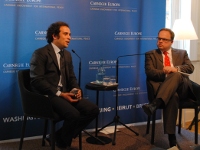Registration
You will receive an email confirming your registration.
Mass protests in Egypt have ended President Hosni Mubarak’s thirty-year rule. However, despite the Egyptian revolution’s historic scope and achievements thus far, building a democratic and transparent society free from authoritarianism and corruption will require reconstruction and institutional reform.
At an event hosted by Carnegie Europe, Carnegie’s Amr Hamzawy discussed the situation in Egypt, the outcome of the March 19 referendum on constitutional amendments, and the steps the country must take to ensure its safe transition to democracy. Hamzawy, who has been in Cairo since the early days of the protest movement, is a member of the committee that mediated between protesters in Tahrir Square and the ruling military council. Carnegie’s Jan Techau moderated.
Constitutional Amendments Referendum
Hamzawy observed that more than 40 percent of eligible Egyptian voters participated in the referendum, a substantial increase from the 5 percent participation rate in a 2007 constitutional referendum. This substantial increase illustrates the Egyptian people’s commitment to building their country in a democratic manner, he said. Hamzawy added that for the first time since 1952, when the republic was formed, all of the elements necessary for a serious electoral process were present: a clear choice between accepting and rejecting the amendments, the participation of many voters, and the presence of civil society monitors to oversee the polling centers.
Observations of the Revolution
- Political participation: Since 1952, the participation of Egyptian citizens in politics has been suppressed, Hamzawy said. Now, however, the citizens are engaged, as shown by the high voter turnout for the referendum and the proliferation of new political parties and civil society initiatives.
- Weak Egyptian state: Egypt’s institutions, believed to be strong and unshakable, instantly lost their credibility once they were unable to control the demonstrations, argued Hamzawy. Only the military was able to police society and assist with the transitional period. As Egypt builds a new, stronger state, it must ensure that the country’s executive, legislative, and judicial branches remain autonomous, to avoid another overly powerful executive branch, Hamzawy noted.
- Egyptian unity: Sectarian tensions were pushed aside during the revolution and the Egyptian people worked as one, Hamzawy observed. All sectors of society participated peacefully.
Challenges Ahead
- Re-examining the voting system: With parliamentary elections slated for September, Hamzawy said that the internal workings of the voting system must be addressed. Some of the decisions that need to be made include determining whether the Egyptian parliament should remain a two-chamber parliament until the new constitution is approved and whether the individual candidate system, which enabled patrimonial networks to dominate parliamentary elections, will be replaced by a mixed party system, ensuring that the total amount of party members in parliament reflects the overall proportion of votes received.
- Sustaining new political movements: Political parties formed since the revolution need enough time to properly organize so they can compete against already established parties like the Muslim Brotherhood and the National Democratic Party (NDP) in the parliamentary elections, Hamzawy stated. He stressed that since most of the demonstrators had previously not belonged to a political party, they would likely gravitate to the newly formed parties, which would need more time to fully form their views. If the newer parties and initiatives were not empowered, then the two strong parties would likely shape the new parliament with their views and positions, ignoring those of the general Egyptian public, eventually resulting in an imbalanced constitution, Hamzawy contended.
- Negotiating the constitution: Once the debate over the constitution begins, a number of key constitutional assumptions may be challenged, Hamzawy said, including the article that declares Islam as Egypt’s state religion, as well as the article outlining the Egyptian political system as a presidential system. Hamzawy added that he soon expects debate on whether Egypt should be a parliamentary republic or a presidential republic and predicted that these issues would be difficult to resolve.
How Europe Can Help
- Avoid providing support to specific political movements: Hamzawy argued that Europe should not provide support to specific political parties and civil society organizations, but instead should provide support across ideologies. Offering government-to-government assistance would avoid strengthening the agendas of individual organizations.
- Government-to-government assistance: Hamzawy stressed that Europe can help Egypt on a government-to-government level, specifically by providing economic assistance, supporting public hearings on nationwide domestic initiatives, helping with state-building and security reform, managing challenges in conducting elections, and promoting transparency and accountability in developing Egyptian institutions.
